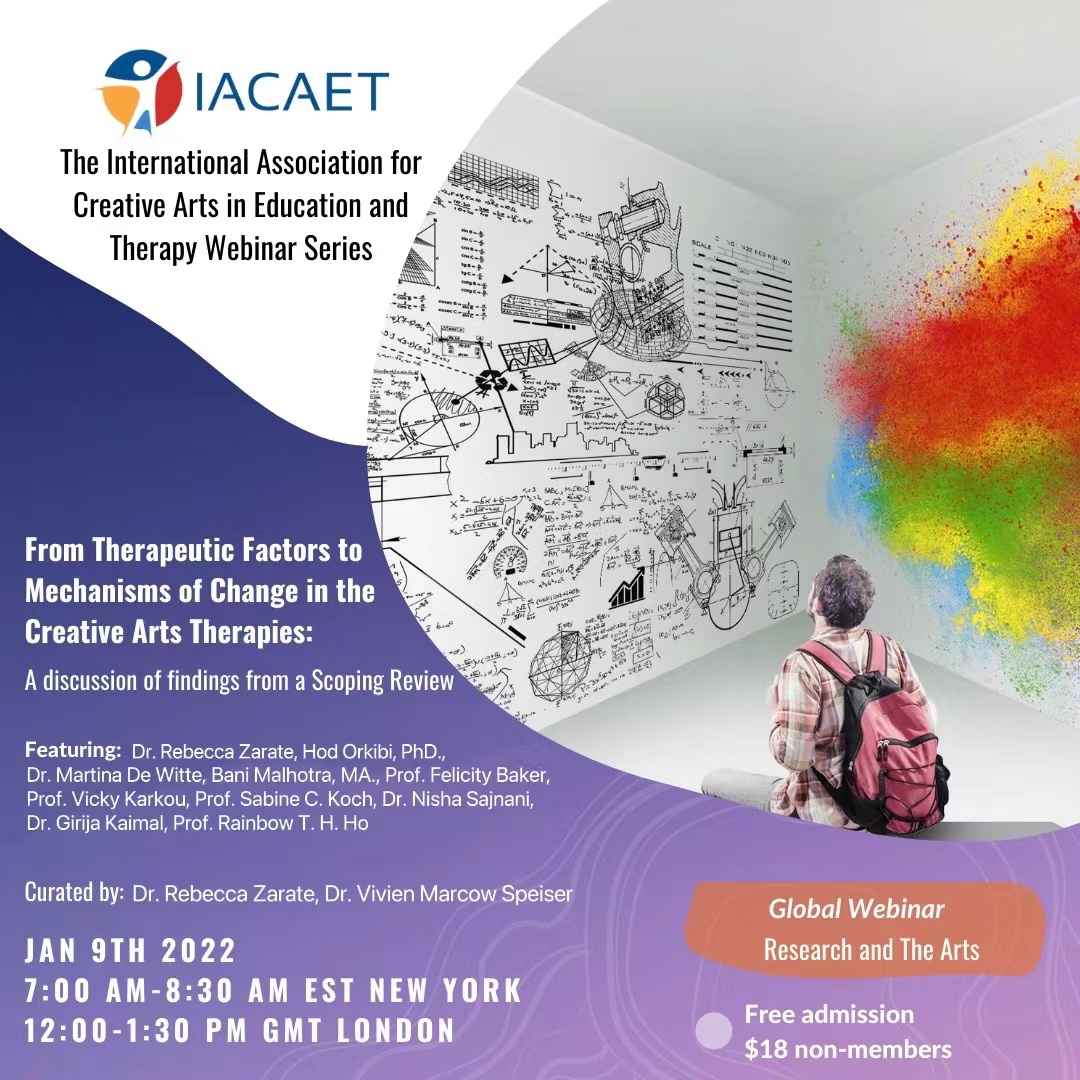From Therapeutic Factors to Mechanisms of Change in the Creative Arts Therapies: A discussion of findings from a Scoping Review

From Therapeutic Factors to Mechanisms of Change in the Creative Arts Therapies: A discussion of findings from a Scoping Review
IACAET Global Webinar series ‘Research and the Arts’ — Part one
Time: January 9th 2022, 7:00 AM – 8:30 AM (New York)/ 12:00 PM – 1:30 PM (London)/ 8:00 PM – 9:30 PM (Beijing)
In this global webinar, we will share the findings of a scoping review on change factors in creative arts therapies, which is published recently on ‘Frontiers in Psychology‘, and discuss how these findings can positively influence the development of both CATs’ theory, research, and practice, as well as training and education in the international community. This team came together as part of a strategic plan to build capacity in our global research community for creative arts therapies and the larger arts and health conversation. The problem we identified illuminated that while the creative arts therapies have demonstrated a rapid growth of empirical studies over the last decades, and the findings of these studies substantiate that CATs have positive impact on a range of outcomes, it remains unexplored how and why CATs account for these effects. To gain more insight into why and how CATs impact outcomes, it is important to pinpoint which therapeutic features of CATs are unique and essential (specific factors) and which features are generic (common factors). To provide an overview of the assumed change factors or mechanisms of change and to gain more insight into how or why CATs may lead to psychological and physiological outcomes, the presenters/authors of this global webinar conducted a scoping review (De Witte et al., 2021). Our scoping review identifies the therapeutic factors and mechanisms of change reported in the literature. Our review clarifies key concepts and definitions and synthesizes the available evidence. We aimed to gain greater insight into why and how the creative arts therapies impact outcomes, and to pinpoint which therapeutic features of creative arts therapies are unique and essential and which are generic and/or not essential. Out of 4,591 articles, we identified 68 studies that focused on the change process and mechanisms focusing solely on psychological wellbeing outcomes. We coded for common factors (common with psychotherapy factors), specific factors (unique to each specialization) and joint factors (overlapping with creative arts therapies). An inductive approach to data analysis was applied to allow findings to emerge from the frequent, dominant, or significant themes inherent in raw data. Nineteen domains of creative arts therapies change factors were identified including “embodiment,” “concretization,” and “symbolism and metaphors.” Our research findings amplify the need for CAT–specific change process research and bring forth a conversation on how our global professional understanding of change processes is evolving.
Speakers:
Rebecca Zarate, Music therapist
Hod Orkibi, Psychodrama Therapist
Martina de Witte, Music Therapist
Bani Malhotra, Art Therapist
Felicity Baker, Music Therapist
Vicky Karkou, Dance/movement Therapist
Rainbow Ho, Dance/Movement Therapist
Nisha Sajnani, Drama Therapist
Girija Kaimal, Art Therapist
Sabine Koch, Dance/Movement Therapist
Curators:
Rebecca Zarate & Vivien Marcow Speiser
Attendees learning outcomes:
1.Getting familiar with the sequence of Intervention – Change Factor – Outcomes.
2.Awareness and understanding of specific intervention components / characteristics: how can they influence outcomes?
3.How can knowledge on change factors / mechanisms of change, positively influence the (further) development of CATs practice, training program and research?
Register here
(This event is free for IACAET Registered members).
Additional Details
Event Mini Content
Creative arts therapies have a positive impact on a range of outcomes. Yet, it remains unexplored how and why CATs account for these effects. To gain more insight into why and how CATs impact outcomes, it is important to pinpoint which therapeutic features of CATs are unique and essential (specific factors) and which features are generic (common factors). The findings identified 19 domains of creative arts therapies change factors including “embodiment,” “concretization,” and “symbolism and metaphors.” Our research findings bring forth an international conversation on how our professional understanding of change processes is evolving.






